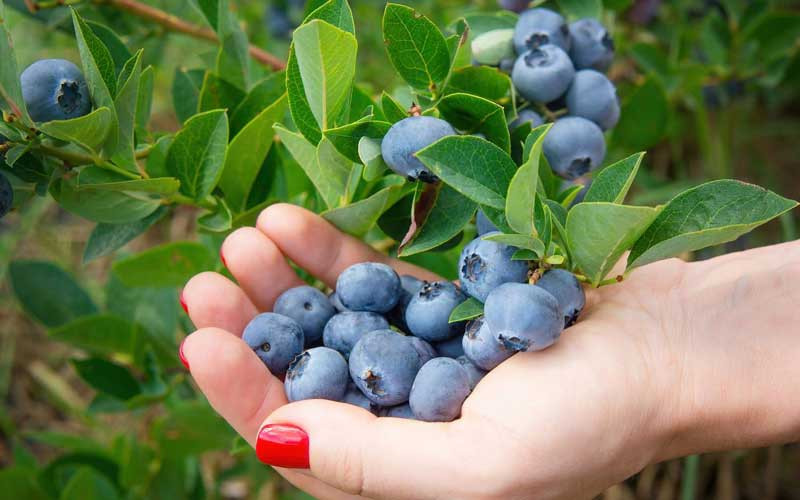
When Edwin Drake struck oil in Pennsylvania in 1859 everyone who caught wind of the word could not be left out of this new and lucrative enterprise, hence the oil rush of the 19th century.
Well let us move closer home, to the geographical region which is the subject of discussion in this treatise.
In the year 1886 in Witwatersrand, South Africa a mineral revolution took place, dubbed the gold rush. “History”, they say, “repeats itself”, some patterns and trends have historic recurrence and whether it is clear to you or not, the blueberry rush is unfolding in Zimbabwe at this point in time.
The country has taken a leading position in blueberry export growth.
The blueberry industry is one of the fastest growing horticultural sectors in area planted and gross value in Zimbabwe.
In 2016 there was zero hectarage under the crop, but in 2023 the nation had 600 hectares dedicated to blueberry, whereby 75% (450 ha) is purely for crop production purposes and 25% (150 ha) for breeding endeavors.
Area under cultivation has grown by 800% since 2008.The country has recorded blueberry export increment of 63% or 1200 tonnes in five years. In the year 2022 alone exports grew by 85% or 2,3 kilotons.
A glimpse at these statistics partly explains why South African farmers are moving northwards to set up blueberry enterprises in Zimbabwe.
- Zim must step up to increase exports: UK
- UK deports 9 Zim criminals
- US, UK dismiss anti-sanctions marches
- Mass teacher exodus looms
Keep Reading
These farmers enjoy advantageous growing conditions than in South Africa.
Due to the geographical features of the country (climate, water bodies, soil, topography), the blueberries from Zimbabwe get on the market four weeks earlier than those from counterpart producing countries.
Moreover, the Zimbabwean berries stay on the market two to three weeks longer than those of most players on the market.
This is reminiscent of the tobacco industry where the nation’s tobacco is one of the most sought-after owing to the genotypes and the advantageous environmental conditions.
A bonus for the farmers producing in this counter-season country is the inexpensive labour.
Blueberry production is labour-intensive and carrying out operations in Zimbabwe where the labour cost is three times less than in South Africa significantly lowers the cost of production.
What does this spell for United Kingdom (UK) farmers?
Opportunities and arbitrages.
See, a significant portion of the blueberries are exported to South Africa for re-export and can you guess the export destination?
The United Kingdom indeed.
From there the berries are further distributed to other parts of Europe. This is big business that the UK farmers can tap into.
The entrepreneurial UK farmers take the same route that South African farmers are plying and set up enterprises in Zimbabwe.
This will see the farmers shipping the blueberries directly to the UK cutting down on the export premiums that are put on the product as it is initially exported to South Africa and subsequently the UK.
The rationale here presented is that the UK farmers and agropreneurs need not stand aloof but come to party and tap into this US$5,2 billion global industry, enjoying the arbitrages offered by producing in Zimbabwe.
Blueberry imports have surged from 37 000 tonnes in 2014 to 113 000 tonnes in 2019.
The farmers in Zimbabwe aim for a premium crop fetching high prices so as to justify the high costs of establishing the orchards.
Depending on the variety, at average a plant produces 4kg of fruit and with a plant population of 6 000 plants per hectare that translates to a yield of 24t/ha.
Factoring that prices range from US$2,5 and US$6 per kilogram, the average price would then be US$4.25/kg. We multiply that with 24 tons and we get an average return of US$102 000/ha.
This year with the El Nino effects negatively impacting the Peruvian blueberry industry resulting in a year-on-year decline in export volumes, the prices will be quite favorable for market players such as Zimbabwe.
The horticultural development council of Zimbabwe aims to have 4 000 hectares under the blueberry production and this presents an exciting opportunity for entrepreneurial foreign farmers, particularly the UK farmers since a major portion of the exported blueberries from Zimbabwe and South Africa are destined for the UK before redistribution to other parts of Europe.
The UK farmers can either enter into joint-venture agreements with Zimbabwean farmers keen on such an arrangement or contracting the local farmers via out-grower schemes.
In both cases the agreement between the involved parties is ratified by the state through the Ministry of Lands, Agriculture, Fisheries, Water, Climate and Rural Development.
This ensures security to the concerned parties. Blueberry production is a high priority sector for the nation, just like the tobacco sector which was protected even when tension around the land reform programme occurred.
Joint ventures and contracting have created an avenue through which foreign entrepreneurial farmers and agribusinesses can set up shop and reap handsome dividends.
For example, the establishment of enterprises by the Chinese in sectors such as tobacco, cereal production, soy bean growing, etc. has thrived on the backdrop of joint-ventures and contract farming.
Of the diverse contactors plying their trade across various sectors of agriculture in Zimbabwe some have market arrangements with the Netherlands and other European markets instead of going through a third party.
Now turning to the oil rush anecdote we encountered earlier, among those who envisaged a well-structured industry and profitable enterprise, besieged chance, conquered chance and made chance the servitor came out formidable titans like John D. Rockefeller.
- Nyasha J. Kavhiza is a seasoned agronomist, consultant and PhD scholar who writes in his capacity. He can be reached at [email protected].










